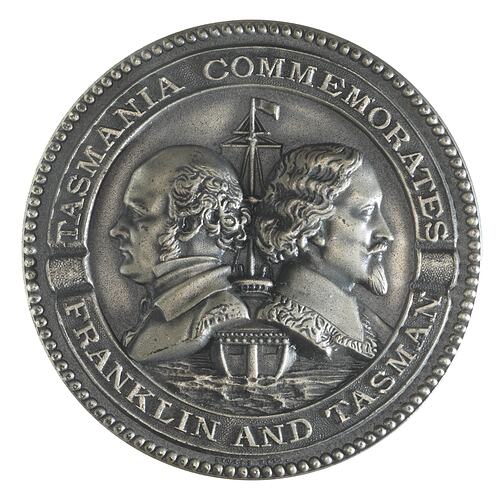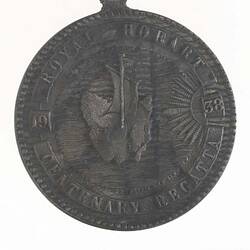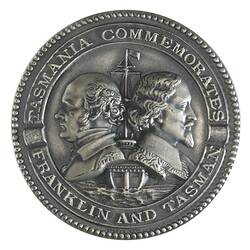Sir John Franklin was born in 1786 in Lincolnshire, England. He was educated at St Ives and Louth Grammer School before entering the Navy at 14. He saw his first active battle, the battle of Copenhagen, when aged only 15. He served as midshipman on the Investigator under his uncle Matthew Flinders, during its voyage of discovery to New Holland in 1801-04, and later said that this voyage kindled his life-long passion for exploration. He returned to naval duty in time to be signal-midshipman at the battle of Trafalgar. Three years of peace followed, and Franklin was allowed time ashore to continue his studies of geography and navigation, begun under Flinders.
In 1818, after years of routine naval work, Franklin sailed as second-in-command of an Admiralty expedition in search of the North-west Passge. Ice blocked its path and the expedition was unsuccessful. In 1819-22 he led an expedition across Canada to Arctic America, enduring appalling hardships. He was promoted to captain on his return, became a member of the Royal Society and in 1823 married Eleanor Anne Porden, with whom he had a daughter. In 1824-28 he commanded another expedition to Arctic American. His wife died during his absence and he married Jane Griffin in 1828, at the age of 42. They had no children.
In 1830-33 Franklin commanded the Rainbow off the coast of Greece during its war of indepedence. He then accepted the position of lieutenant-governor of Van Diemen's Land, arriving in Hobart in 1837. Franklin was nearly 50 and lacked civil experience. He showed himself to be liberal-minded, and cordial to his officials, but many saw him as overly familiar and dominated by reactionary men. His lack of power to improve the Constitution also frustrated his work. He struggled to implement changes to the convict system, and free settlers resented him as an English overseer.
Franklin believed that education was important for social cohesion, and founded the secular Tasmanian system of state primary instruction. He imported English teachers, founded Christ's Church College and provided scholarships to enable Tasmanians to attend university in England. He also founded the Tasmanian Natural History Society and furthered the work of scientists such as John Gould and Strzelecki. He also encouraged exploration. However, Franklin had a rocky relationship with his powerful colonial secretary, and for suspending him was censured and recalled to England. His colonial secretary suggested that his wife had interfered in the government of Tasmania, and it seemed that his career would end in dishonour.
A naval expedition was again being organised. Franklin was really too old to go at the age of 59, but was finally permitted to set sail. The Erebus reached pack ice off the coast of King William's Island, and was within sight of the elusive North-west Passage when Franklin died.
References:
Australian Dictionary of Biography website http://adbonline.anu.edu.au/adbonline.htm
More Information
-
Keywords
-
Localities
-
Authors
-
Article types


